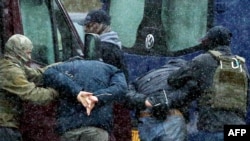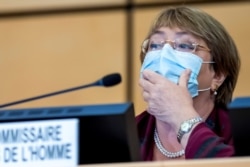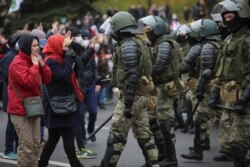U.N. High Commissioner for Human Rights Michelle Bachelet condemned gross violations of human rights in Belarus on Friday, calling on the government to put an end to the abusive treatment of its people.
Bachelet told the U.N. Human Rights Council that conditions in Belarus have deteriorated since the council held an urgent debate on the human rights situation in September, following Belarus' widely criticized presidential elections August 9.
More than 27,000 people have been arrested, including senior citizens participating in peaceful marches, she said, adding that penalties imposed on protesters appear to be growing more severe, with over 900 people reportedly having been treated as suspects in criminal cases.
Security forces have used tear gas, water cannons, rubber bullets and stun guns to disperse crowds, Bachelet said, and at least four people have been killed.
"We also have multiple and credible reports of people beaten by members of the security forces during and after their transport to police stations or detention centers," she said. "If confirmed, such incidents should constitute ill-treatment and, in some cases, may amount to torture. Moreover, masked men, without insignia or identification, have frequently taken part in the dispersal of protests, alongside riot police."
Up to 2,000 complaints of torture of people while in custody were lodged by the end of October. Such actions heighten a climate of fear and an atmosphere of lawlessness and impunity, she said.
"Many people who have been detained have reported being held in overcrowded cells, without adequate ventilation — despite the risks linked to the COVID-19 pandemic — denied food, water, access to the toilet and medical treatment," Bachelet said. "They have further reported violent and random beatings as well as acts of humiliation, insults and threats."
The high commissioner is calling on the government to immediately release all those unlawfully detained, to respect the right of peaceful assembly, and to ensure independent and impartial investigations into cases of alleged torture and other human rights violations.
Belarus Ambassador to the U.N. in Geneva Yuri Ambrazevich accused the U.N. of distorting the situation. He said full-fledged wars have received less attention than is being directed at his country.
The pressure being exerted on Belarus violates the U.N. Charter on the principle of non-interference in the internal affairs of a sovereign state, he said, blasting the European Union for imposing sanctions on Belarus, which he said clearly violated international law.






